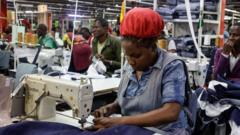The textile sector in Lesotho confronts significant challenges following President Trump's 50% import tariff announcement, putting the future of the African Growth and Opportunity Act at risk, which has been vital for trade between the US and African nations.**
Trump's Tariff Announcement Throws US-Africa Trade Relations into Turmoil**

Trump's Tariff Announcement Throws US-Africa Trade Relations into Turmoil**
Lesotho's textile industry faces a precarious future as Trump imposes hefty tariffs, jeopardizing the African Growth and Opportunity Act.**
Lesotho's garment industry woke up to a grim reality Thursday when President Donald Trump announced a staggering 50% import tariff on the country’s textiles exported to the United States. This shocking decision has left business owners like Teboho Kobeli, who employs 2,000 people at Afri-Expo Textiles, grappling with the potential loss of a critical market that has supported their livelihoods and contributed to the national economy.
The African Growth and Opportunity Act (Agoa), a 25-year-old initiative designed to facilitate African exports to the US without tariffs, is now in jeopardy. Once hailed as a sign of progress in US-Africa economic relations, Agoa provided essential support aimed at bolstering African industrialization and addressing poverty. While its impact has been debated, many argue it has facilitated significant job creation within the region, notably within Lesotho’s thriving textile sector.
Confusion prevails across the continent post-announcement; South Africa's officials interpret the new tariffs as a blow to Agoa's benefits. The country's trade ministers emphasized that the reciprocal tariffs could negate the tariff-free advantages that Agoa provided, signaling a critical blow to South African exports. Meanwhile, Kenya’s government remains hopeful that their clothing manufacturers will withstand the storm; they remain optimistic about maintaining competitiveness despite the tariff headwinds.
As uncertainty mounts, so too does apprehension regarding the future of Agoa. Originally slated for renewal soon, the act may not see a resurgence, especially given the current political climate. Since its introduction, Agoa has granted eligible sub-Saharan African nations preference for exporting various goods, from textiles to minerals, provided they comply with specific political and economic conditions. In 2023, trade values under Agoa accounted for an estimated $47.5 billion, underscoring its importance to both US businesses and African economies.
The implications of a potential withdrawal from Agoa could be devastating for countries like Lesotho, where reliance on US markets for garment exports is high. Financial analysts suggest that a sudden 50% tariff could contribute to a significant economic downturn, exacerbating poverty levels and welfare challenges within the region.
While some nations, like Kenya, hope to negotiate favorable terms despite the tariffs, the overarching concern is Trump's unpredictable trade policy, which seems devoid of a coherent strategy. Analysts warn that this could diminish American influence in Africa, allowing countries like China, which already holds the title of Africa's largest trading partner, to take further advantage of the situation.
The recent tariff announcement follows broader challenges within the US foreign aid framework, emphasizing America's decreasing humanitarian and economic commitments in Africa. Agoa was once regarded as a vital component of US soft power in the region; however, with current political dynamics, its future appears bleak.
In light of these developments, African nations may need to pivot towards establishing their own continental trade frameworks and seeking new partners to mitigate potential fallout from US market dependency. As global trade scenarios evolve, Africa's response to these tariffs will significantly shape its economic strategies moving forward.
In conclusion, the implications of Trump's tariff measures bring profound uncertainty not just to Lesotho, but to various sub-Saharan nations heavily reliant on Agoa as their gateway to the US market, demanding a critical reassessment of strategies toward achieving resilient economic partnerships in an increasingly volatile global landscape.





















